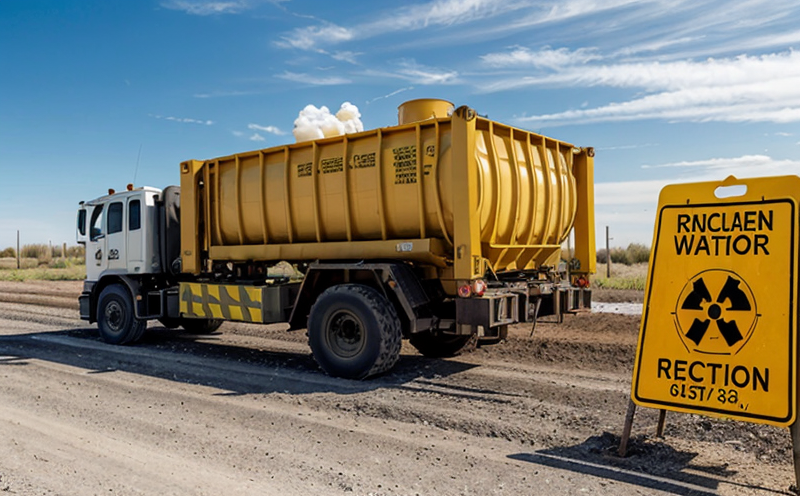EN 261 Containment Integrity of Nuclear Waste Drums
The CEN standard EN 261 specifies methods to determine the containment integrity of drums used in nuclear waste management. This service is critical for ensuring that radioactive materials are safely contained and do not pose a risk to human health or the environment.
The primary focus of this service is to evaluate the structural integrity of drums by subjecting them to hydrostatic pressure testing. The test aims at identifying any potential flaws, breaches, or leaks in the drum’s containment system that could lead to the release of radioactive materials into the surrounding environment. This process ensures compliance with regulatory standards and international guidelines.
The standard is applicable to metallic drums used for packaging waste generated by nuclear fuel cycle facilities, including spent fuel, reprocessed materials, and other radioactive waste. The service provided here includes a comprehensive range of testing procedures that are aligned with EN 261 and other relevant international standards such as ISO 14938.
Key parameters in the test include pressure levels up to 50 bar for high-pressure drums and lower pressures for low-pressure drums, depending on the type of waste. The specimen preparation involves ensuring that the drum is clean, free from contamination, and properly sealed before the test begins. The test apparatus used includes a hydraulic press capable of applying the required pressure accurately.
Acceptance criteria are strictly defined in EN 261. A drum passes the test if it can withstand the specified pressure without any visible or measurable leaks. In case of failure, further inspection and repair may be necessary to ensure the containment integrity before retesting.
| Parameter | Specification |
|---|---|
| Test Pressure Range | 10 bar - 50 bar, depending on drum type |
| Acceptance Criteria | No leaks or breaches visible under test conditions |
The service also includes detailed reporting of the testing process and results. The report provides a comprehensive overview of the drum’s performance during the test, including any anomalies observed, recommendations for improvement if necessary, and compliance with EN 261.
Quality managers, compliance officers, R&D engineers, and procurement personnel in the nuclear waste management sector will benefit from this service as it ensures that drums used in handling radioactive materials meet stringent safety standards. This is crucial not only to comply with regulatory requirements but also to protect public health and the environment.
Scope and Methodology
The scope of the EN 261 Containment Integrity Testing service includes the following:
- Evaluation of containment integrity using hydrostatic pressure testing.
- Determination of pressure levels that the drum can withstand without leaking or breaching.
- Inspection and reporting on any defects or breaches identified during the test.
The methodology for conducting this service involves several key steps:
- Preparation of the drum, ensuring it is clean and free from contamination.
- Sealing the drum to ensure that no external factors interfere with the test results.
- Application of hydrostatic pressure up to the specified limit for the drum type.
- Monitoring the drum’s performance under pressure conditions.
- Evaluation of any defects or breaches observed during the test.
- Reporting the findings and providing recommendations for improvement if necessary.
| Key Steps in Testing | Description |
|---|---|
| Preparation | Ensure drum cleanliness and sealing integrity. |
| Testing | Apply hydrostatic pressure according to EN 261 specifications. |
| Evaluation | Analyze any defects or breaches identified during the test. |
| Reporting | Document findings and provide recommendations for improvement. |
The testing process is conducted in a controlled environment to ensure accuracy and reliability of results. Compliance with EN 261 ensures that only drums meeting the highest safety standards are used in nuclear waste management operations.
Industry Applications
- Nuclear power plants
- Reprocessing facilities
- Waste disposal sites
- Radiation laboratories
The EN 261 Containment Integrity Testing service is widely used across various sectors involved in nuclear waste management. It ensures the safe handling and disposal of radioactive materials, reducing risks associated with leaks or breaches in containment systems.
| Applications | Description |
|---|---|
| Nuclear Power Plants | To ensure that spent fuel and other waste products are securely contained during transport and storage. |
| Reprocessing Facilities | To verify the integrity of drums used in reprocessing materials, ensuring no radioactive contamination is released into the environment. |
| Waste Disposal Sites | To confirm that waste drums meet safety standards before being sent for disposal. |
| Radiation Laboratories | To validate containment systems used in laboratory settings where radioactive materials are handled. |
By adhering to EN 261, facilities involved in nuclear waste management can ensure that their operations comply with international safety standards and regulations. This service is essential for maintaining the highest levels of safety and reliability in handling and disposing of radioactive materials.
Eurolab Advantages
Eurolab offers a range of advantages when it comes to providing EN 261 Containment Integrity Testing services:
- Expertise: Our team comprises highly qualified professionals with extensive experience in nuclear waste management and testing.
- Accreditation: We are accredited to perform tests according to international standards, ensuring the highest level of accuracy and reliability.
- State-of-the-Art Facilities: Our laboratories are equipped with advanced testing equipment that meets the stringent requirements of EN 261.
- Comprehensive Reporting: We provide detailed reports that include all test parameters, findings, and recommendations for improvement.
- Regulatory Compliance: All our services are designed to comply with international regulatory standards, ensuring your operations meet legal requirements.
By choosing Eurolab for your EN 261 Containment Integrity Testing needs, you can be confident that your nuclear waste management processes are safe and compliant with the highest industry standards.





